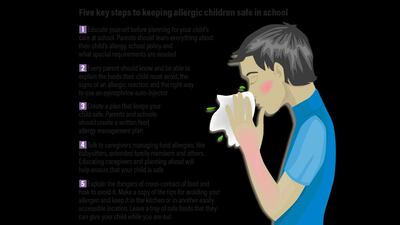Parents and schools are being encouraged to learn more about the devastating reaction some children can have to nuts following a decade-long rise in the numbers developing serious allergies.
Doctors in Dubai have said some parents do not take the risk seriously, and that more children are showing signs of an allergic reaction that can be fatal in extreme cases.
Although UAE figures are not available, the World Allergy Organisation and doctors suggest food allergies have risen globally by as much as 400 per cent in a decade.
“Children’s allergies can increase over time but we now have about 20 children at the school with severe allergies,” said Dr Sadaf Jalil Ahmed, the doctor at Deira International School.
“Very few parents can be bothered to take this issue seriously as it does not directly affect them.
“But parents with children who have these allergies are on their toes all the time, as it can be life-threatening.
“Irrespective of how many times we try to educate them, some parents continue to push the boundaries and still don’t appreciate how serious contact allergy can be.”
_______________
Read more:
[ Allergies: ‘Parents don’t understand how easily it can happen and how serious it is’ ]
[ Always on alert – families and experts talk about coping with food allergies among children ]
[ UAE couple urges more understanding of food allergies after son suffers reaction ]
_______________
Deira International School is leading the way with its approach to nut allergies, with signs up around the premises reminding pupils and staff of the potential problem.
Newsletters are also regularly sent home to parents with the latest advice, and strict action plans exist to help deal with incidents of pupils going into anaphylactic shock.
If a child brings in the wrong kind of food that could pose a threat, the school replaces that meal and sends a reminder letter home to parents about the rules.
“We have had a child who had been on a trip and had food that was supplied by an outside caterer,” said Dr Ahmed.
“The child started having difficulty breathing but we managed the case on site without the need for an ambulance.
“Every time the phone rings and the school number shows up, it must be so traumatic for the parents as they know how serious a reaction can be.”
In the US, it is estimated that 20 per cent of children have allergies of some kind, and there has been a 300 per cent increase in asthma cases, and a 56 per cent increase in asthma-related deaths.
Dr Ravi Gutta, an immunology consultant and chief of allergy at City Hospital, Dubai Healthcare City, has been training schools to help achieve a wider acknowledgement of allergies in children.
“In the past five years the shocking statistic is that peanut allergies have gone up by between 300 to 400 per cent, especially in children,” he said.
“The consensus as to why is because of changes to the way peanuts are now processed, using a dry roasting technique in extreme temperatures rather than a boiling and frying process.
“The same process is used to make peanut butter and other confectionary, so the peanut becomes more allergenic.
“There are also more environmental and genetic factors that are contributing to the rise in allergic reactions.”

Nuts and shellfish are the most common food allergies but doctors have also seen more reactions to sesame seeds in the past decade, again as a result of the processing.
In the first year of life, milk allergy is very common, then egg, wheat and soy allergies take over, but children often grow out of them.
“When we go to schools we educate about identifying an allergic reaction and how to treat it,” said Dr Gutta.
“Cross-contamination is also important for children to understand as they often share their food so they need to be aware of the problems this can cause.
“We highly advise schools to have peanut-free zones, or safe places where children can go to eat where they will not be in contact with some goods which can cause a dangerous reaction.”
An allergic reaction can manifest on the skin of children, and then develop to cause gastro problems such as diarrhea.
Statistics shows peanut allergies cause more serious reactions, and tests show much higher antibodies in those who suffer a reaction.
“We have definitely seen an increase in allergies in children,” said Dr Dinesh Banur, a paediatrician at NMC Royal Hospital in Abu Dhabi.
“Exposure to less allergens results in a predisposition to developing allergies. Nut allergy is one of many allergies on the rise.
“We also know that children exposed to a variety of new foods earlier in life, including nuts, increases the chances of developing an immunity is greater than those children who have these foodstuffs at a later time.”






